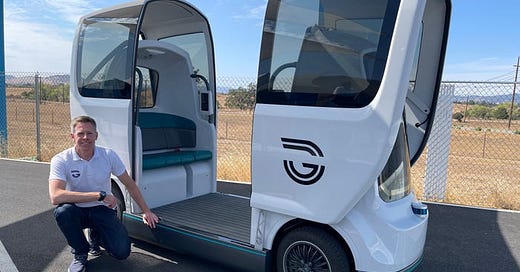Heya friends, happy Friday.
Like many folks in the US (and abroad), I despaired to learn of Ralph Yahl’s shooting earlier this week. If you’d like to take action, you can contribute to Ralph’s gofundme, or perhaps brush up on some anti-racism training (might I recommend An Upending of Whiteness in Defense of Living on April 27th).
In addition, my heart has been breaking with the current political crisis in Sudan. If you’re unaware of the current (and evolving context), the Associated Press has an article about why it matters. In addition, I’d highly recommend following Yassmin Abdel-Magied on twitter for a more personal understanding of how the war is impacting Sudanese people (and all of us!) globally.
Alright, time for this week’s transport news:
Government and Policy
This week’s positive new story is that a bill in Texas has been introduced that would allow cities to reduce speed limits in residential areas without traffic studies! In our twisted world, “traffic studies” are often strategies politicians / policymakers use to delay action—especially when specific policies have been proven repeatedly (such as decreasing speed limits helping to save lives!).
Dubai introduces new laws for AVs
But there’s not much substance yet. The new law essentially makes it possible for Dubai’s Roads and Transport Authority (RTA) to develop strategic plans and policies to improve the operations of autonomous vehicles. RTA will set technical, operational, and safety benchmarks for the AVs and identify categories of AVs. In addition, they will restrict the roads, areas, and routes that AVs operate in, set their speed limits, and develop the infrastructure necessary for their operation.
Last week I shared new research about road rage and how it impacts driver performance, and this week The Drive wrote a piece about what it means for AVs. Anecdotally, I spoke with my favourite bike shop owner in SF this week, who shared a reflection on AVs that surprised me: he felt safer seeing an AV behind him than a car driver because he knew the AV wouldn’t revenge pass or road rage drive behind him. His thinking was that without the emotions of driving, road rage against pedestrians, people biking, and other road users would lessen, creating safer transport networks. Curious about your thoughts on the matter, reader!
San Jose Airport introduces AVs
San Jose Airport authorized a new fleet of AVs to connect the airport to the local train station (!). We love a multi-modal, first- and last-mile connection to public transit. Glydways will build elevated pathways financed through a public-private partnership as part of the program. It’ll be interesting to see how this program comes to fruition (and when! given the need to construct new infrastructure).
Industry
Asda plans to use AVs for grocery deliveries
British grocery store chain Asda is partnering with Wayve to roll out AV deliveries in London. This will be the largest autonomous delivery trial with customers, with 72,000 households in London randomly selected to participate in the service. An Asda worker and supervising Wayve safety driver will be in the vehicle when making deliveries.
Tesla was involved in another fatal crash
Tesla reported another fatal crash last week, the 17th fatal crash associated with their automated driving program since June 2021 (when they were forced to start reporting on fatalities). The crash involved a Tesla Model S that collided with an emergency vehicle in February in the San Francisco Bay Area.
And to top it all off, Elon Musk’s wealth dropped by $13 billion (! billion !).
Fully automated construction vehicles
I don’t typically share much about some of the fringe cases of automated technology, but this one caught my attention. Have you ever thought about pile drivers, forklifts, and other traditionally manual vehicles becoming ~robotic~? Me neither! So I was interested in learning more about companies applying automated technology here and considering the potential ramifications (on jobs, site safety, and more).
Ford gets the green light for automated driving in the UK
Ford’s BlueCruise was given the green light to allow drivers with the program to drive hands-free on UK roads for the first time. Drivers can take their hands off the wheel but must still pay attention to what the car is doing, with an alert system in place if internal cameras detect them looking elsewhere.
Research
The cost of building highways is increasing
New research from the Eno Center for Transportation shows that highway construction costs in the US have increased 50% in the last two years. The primary reason is inflation (quelle surprise!). The research shows that a sharp increase in materials and fuel costs is driving up entire program costs, meaning that we’re getting less and less highways for more and more money.
Opinion
The fifteen-minute city and culture wars
“There are many reasons that reasonable, life-improving policies to reform America’s car culture may languish in culture-war purgatory. First, there is no concept that cannot be plucked from obscurity by the right and elevated to conspiracy—witness, for example, the movement’s success at turning ignorance about “critical race theory” into bans on books featuring Black characters and historical figures. The urban planning world is filled with concepts that are just as exploitable. The science of climate change, which has already been the subject of decades of disinformation, faces an even bigger challenge fighting back against bad-faith actors.”
Extra Bits + Bobs
This week I read this really dramatic story about a doughnut shop that wanted doughnut art but was told that given the nature of their business, it was, in fact, an advertisement and not art — and was forced to remove their local art. If you also enjoy pedantic drama about bureaucracy, this one goes above and beyond (no spoilers!).
Next up, I wanted to share that this week’s episode of Ted Lasso featured *so many bikes* and I am confident many readers were also heart-warmed to see the team go multi-modal.
That’s all from me! Have a beautiful weekend, friends.
Sarah





